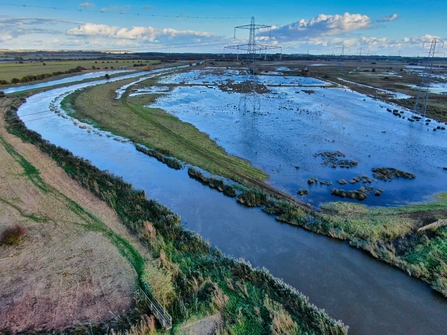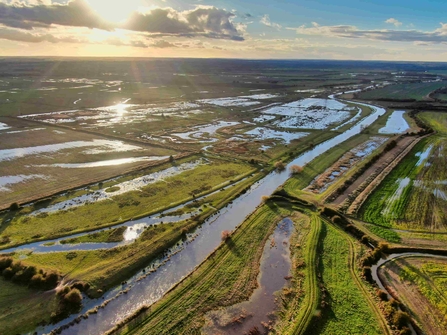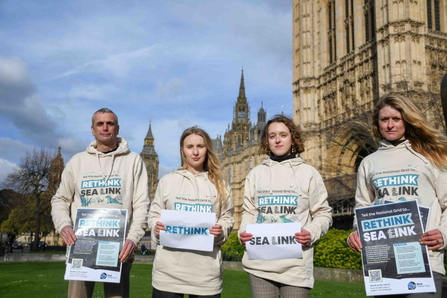Podcast transcript
The following conversation starts at timestamp [37:32] in the podcast.
Rob: Now, Sea Link. This is a project which National Grid are proposing that will connect an undersea electricity cable from Suffolk to Kent and come ashore at Pegwell Bay and Kent Wildlife Trust are not happy about it. The issue isn't to do with the principle of renewable electricity - which of course is vital for transitioning away from fossil fuels - but the practicalities of what they want to do with the cables, and the buildings needed where it comes ashore, especially the construction of a huge converter station on Minster Marshes, which is a nationally important site for wetland birds and home to a SSSI... Well, that is an issue. And when I say Kent Wildlife Trust aren't happy, they're not the only ones.
Sir Roger Gale is the MP for North Thanet and he is furious with National Grid over their proposals. I went up to the Houses of Parliament to meet him in the grand surroundings of Westminster Hall and asked him why Sea Link is such a big issue for him.
Sir Roger: Well, I've been fighting a battle over a number of years to protect, first of all, to protect our top-grade farmland because we need it if we're going to be food sustainable and I've been trying to protect farmland from housing, as well as developments like the Sea Link project and in addition to that, I'm absolutely passionate about protecting our environment.
It doesn't matter too much whether it's something industrial like the Sea Link project, which will be hideous, or whether it's a housing estate. People tend not to realise that if you rip hedges out, it’s all good saying “oh we’re going to plant a few trees” -- Birds don't by and large nests in trees. They nest in hedgerows and all sorts of other animals and insects live in hedgerows, so once you start ripping stuff out, you can't just provide a substitute for it.
So this has, this has been a campaign of mine for a long time, generally. I fought the Nemo Project, which was an undersea power line from Zeebrugge to Sandwich. We said that could have gone to Kingsnorth, and it could have done, but that would have meant more cost for the Nemo private company that was running it. So instead, the British taxpayer paid up a lot of money to put effectively, and National Grid paid a lot of money to put up a hideous row of power cables from Sandwich right across to Canterbury.
To set that in context, the pylons are higher than the Bell Harry Tower at Canterbury Cathedral. They are hideous. And not only are they hideous, they are a definite threat to bird life. Yeah, and we've seen bird strikes. We lost the flock of Swans.

© Nik Mitchell
Rob: I think it was a 179 mute Swans were killed in one in go.
Sir Roger: Yes, one whole flight of Swans was lost and unnecessary, and this is what really annoys me, is that there are alternatives. And yet the powers that be seem to think, “Well, we're bigger than you are. We'll blunder ahead and we'll just do it anyway.” Yes, of course we need power and we need renewable power but not at any price environmentally or agriculturally.
Rob: So as the local MP what's the most important thing as far as you're concerned – is it protecting the marshes for the wildlife or is it protecting the agricultural land? What's the key thing that that is motivating you?
Sir Roger: Well, it's both. We need the agricultural land. You can't grow food in window boxes, so we actually need our top-grade agricultural land to grow, in this case, high-quality wheat for bread making and other crops. And we need our natural habitat. And looking ahead with climate change downstream, we have to be very careful indeed what we do. The Minster Marshes and the Ash Levels are both very important pieces of our ecology. We have to protect them and if we don't then our grandchildren won't thank us for it.
Rob: Because you've been, I think are you are you still chair of the All Party Parliamentary Group for Animal Welfare? Is that one of your hats still? I know you wear quite a few hats don’t you but that's one you've worn in the past?
Sir Roger: No, I've had a number of hats in the past. So I was chairman of the All Party Animal Welfare Group for about seven years, and I've been chairman of the Parliamentary Group Against Trophy Hunting and various others. But since I've been serving as a Deputy Speaker, I've tried to relinquish those. That doesn't mean I've relinquished my interest, but I think it's more appropriate if I take a slightly a back seat on some of those issues. But locally I'm as active as ever and will remain so.
Rob: Because I think it's just important that people understand that your care for wildlife and for animals in general, it really does run deep. It's not a kind of a thing that you're just saying “I support this as a campaign”. This is something you're genuinely passionate about.
Sir Roger: It goes back a very long way. I I've got the - I think I'm, at the moment, the only parliamentary holder of the RSPCA 's Richard Martin Award. Richard Martin was an animal welfarist a very long time ago indeed. The award was named after him. He was a Parliamentarian, the award was named after him. I was given that, and I hold it proudly for my part in the campaign against the hunting of wild animals with dogs, euphemistically known as fox hunting.
So yeah, it goes back a very long way. And Susie, my wife, is also absolutely passionate about animal welfare. We've been involved together over well, I was going to say over our forty years in Parliament, but actually goes back even beyond that because we were involved in animal welfare matters before I entered the House.
Rob: So given all of that, are you confident that if National Grid say they're going to mitigate everything so that the wildlife will be protected as far as possible... Do you believe them? Do you trust them?
Nina Jones pointing out damage from the Nemo Link
Sir Roger: I have absolutely no confidence in or trust in National Grid whatsoever. It seems to me that the claims that they have made are at best disingenuous. They say they've looked at alternatives. Well, they may have looked at them, but they haven't looked at them or studied them thoroughly in my view. In this case King's North is an obvious option. The Dutch offshore their infrastructure for projects such as this and do it very successfully. If the Dutch can do it, we can do it. And even if they don't want to offshore it, then National Grid could look and should look again at, I think, King's North.
If they want to get power into London and down to Kent, that is a more obvious and sensible option than the route they're trying to choose. And the reason I'm trying to choose the route is wholly commercial in my view. I think this is more about some wishful thinking that we might one day sell power to mainland Europe and therefore if we've got the infrastructure running down to Sandwich, we can take a line across the channel and flog electricity. That's not going to happen. All of the traffic - almost - virtually all of the traffic into power terms across the Channel has been one way. And it's been from mainland Europe into Britain, not the other way round.
The work that they've done - claimed to have done - on ecological studies is woefully inadequate. And I think we need to see and have a right to see all of the ecological studies that they've done in terms of the effect that it would have upon Pegwell Bay, the Goodwin Sands, and, of course, the SSSI at Minster marshes, which is a vital importance there. That that whole area is host to dozens of species of birds and an enormous amount of other wildlife besides.
Rob: So I'm just gonna play devil's advocate for a moment. There's already Richmond power station has been there for years now, sort of defunct and not operating the same way. There is already a converter station there. The Nemo Link does come in there. Some people will say, “Wait, doesn't matter then, does it, if we put another converter station on the site? You've already got power running through. It can't be any worse than it already is?”
Sir Roger: I think the prospect of dozens of acres of land being taken to build a converter station that is the size of at least two football pitches and ninety feet high is quite appalling. On that landscape it will stick out like a sore thumb. It will be absolutely hideous.
The cables that flow from that up towards Canterbury will provide an additional wildlife hazard for birds, additional to the line of cables that's already there and has already done damage, and it just is unthinkable to anybody with half an eye on the environment and half a care about nature.
But it seems to me that they're blundering ahead because they know best. Well, I'm sorry, they don't know best. And our children and our grandchildren are going to pay the most terrible price for very short-termism.
That's what this really is about. Yes, we need power. Yes, we need renewable power. We are going to need a new generation of small nuclear power stations. We are going to need a lot more offshore wind and we are going to have to feed that into London and into Kent.
But it doesn't have to be done at the expense of our natural environment.

© Nik Mitchell
Rob: I mean clearly, you're passionate about this. It really comes across. What can we do then? What can people, not just in the immediate area of Minster Marshes or Thanet, but across the whole of Kent, what can they actually do then to try and take things forward and get the National Grid to Rethink Sea Link?
Sir Roger: Look, the more people that make their voices heard, the better. The first thing that we need is access to all of these so-called ecological studies that haven't been done actually or haven't been done thoroughly, and then National Grid have to be made to do the work that they should already have done and publish properly before they submit any planning applications at all. But I don't believe that this installation is necessary in Kent at all. Well, Kings North, but that site is there. But we don't have to have an undersea cable. And the idea that this is, you know, they call it Sea Link, as if somehow it's all going to be hidden away underwater, it's not.
The works end of it is going to be one God Almighty eye sore.
That will be damaging to wildlife, damaging to the environment, damaging to farmland, and effectively there forever or for as far as the eye can see. Once it's there, you can't undo it.
You know, it's ‘take paradise, and set up a parking lot’. Yeah.
Rob: So you're in Parliament, you have got the ear of some pretty powerful people. What are you going to be saying to your colleagues who are in government at the moment? You know, if you could get hold of Claire Coutinho, for instance.
Sir Roger: So I'm trying, and I don't doubt that Claire Coutinho will say I'm very trying, but she won't talk to me because she claims she's in a quasi-judicial position and she's not allowed to. And there may be some truth in that, but ministers do have to listen. I've had a conversation obliquely with Graham Stuart, Minister of State and Energy, about it and I say oblique because even then, although he's not the decision taker, he was wary. But basically, they are obsessed with - and I understand why, of course - keeping the lights on, keeping the hospitals powered, finding enough electricity to power all the generation of electric vehicles that have to be charged somewhere. And people think all these things come at no price. Well, of course they do come at a cost.
All that infrastructure has got to be put in and my personal view is it's the wrong infrastructure because I think the future is in hydrogen, not in electricity ultimately, but nevertheless that is the obsession. “Get this done. Head towards net zero. cover the countryside in pylons and power cables if that's what's needed.” Well, I don't accept that at all. The two are not mutually exclusive. You can have, I believe, an environmentally satisfactory network while at the same time protecting our environment.
Rob: So as a as a final thought then because you have been through processes like this before, is there any cause for optimism that we can do something, that we can stick a spoke in the front wheel of the National Grid?

© Tim Horton
Sir Roger: I think we have to be prepared to take this, if necessary, to judicial review. And I think that National Grid has to understand that they will be held to account at every step of the way and that we will fight this to the last ditch – in this case, almost literally. Because if we don't, we're failing our future generations.
We're custodians. We don't own this land. We're caretakers.
Somebody once said to me, “Live as if you're going to die tomorrow. And farm as if you're gonna live forever.” And that's how it should be. But I'd extend that not just to farming, but to the whole of our natural environment.
We are the custodians of it.
We have to preserve it for the future
And I don't think that doing that and providing power to keep the lights on is incompatible. I'm sure it can be done and we have to find the right way of doing it, not the cheapest, nastiest way of doing it.
Rob: Sir Roger. Thank you ever so much.
Sir Roger: Thank you.
Rob: I mean, you can hear just how angry he is about the plans, can't you? If you want to find out more then just search for Rethink Sea Link. There's loads of detail on the Kent Wildlife Trust website and there's a petition already running with almost ten thousand people having signed it. Minster Marshes can only be protected if government comes to understand how important a site it is.